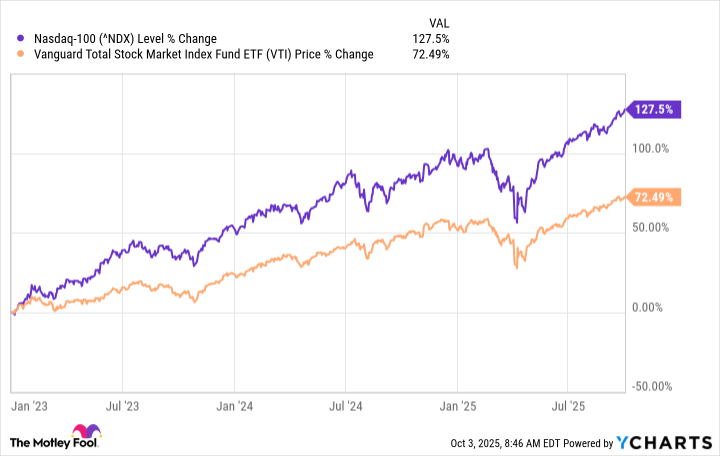The Vanguard Total Stock Market ETF (VTI 0.09%) is one of the most diversified exchange-traded funds (ETFs) money can buy. It tracks the performance of the CRSP U.S. Total Market Index, which invests in all 3,508 companies listed on American stock exchanges, so it's a complete portfolio on its own.
But there are pros and cons to extreme diversification. On the one hand, it can reduce volatility, which leads to steady returns with less risk. On the other hand, a highly diversified ETF won't perform as well as an ETF that tracks concentrated indexes like the Nasdaq-100 or the S&P 500 (^GSPC +0.03%), as they tend to assign higher weightings to hypergrowth stocks such as Nvidia and Palantir Technologies.
With that said, a slow and steady approach can certainly lead to spectacular returns over the long term thanks to the magic of compounding. So, could the Vanguard Total Stock Market ETF be a millionaire-maker?

Image source: Getty Images.
From trillion-dollar giants to under-the-radar growth stories
The Vanguard Total Stock Market ETF is weighted by market capitalization, meaning the largest companies in the fund have a much greater influence over its performance than the smallest. Therefore, its top three holdings are Nvidia, Microsoft, and Apple, which are the world's largest companies, with a combined value of $12.2 trillion.
Those three stocks have a combined portfolio weighting of 18.1% in the Vanguard ETF, which sounds high considering the fund has three-and-a-half thousand other holdings. However, that is much smaller than their combined weighting of 21.3% in the S&P 500 and 37.3% in the Nasdaq-100.
Therefore, the Vanguard ETF gives investors some exposure to the booming artificial intelligence (AI) industry, but its performance doesn't rest on the technology's success quite as much as other index funds. Risk-averse investors might find that appealing, but it has led to lower returns since the AI boom started gaining momentum at the beginning of 2023:
On the flipside, an index like the Nasdaq-100 doesn't offer any exposure to the smaller end of the stock market, so investors may be missing out on the next up-and-coming growth stories. Here are just a handful that investors will find in the Vanguard ETF:
- Upstart Holdings (UPST 2.14%), which developed an AI-powered algorithm to determine the creditworthiness of potential borrowers more accurately than traditional loan assessment methods.
- Lemonade (LMND 3.44%), which is a rapidly growing insurance technology company that uses AI to calculate premiums and process claims.
- Sprouts Farmers Market (SFM +1.26%), which owns 410 organic grocery stores across the U.S. (and growing).
- Tenable (TENB 1.23%), which is a leader in the vulnerability management segment of the cybersecurity industry.
- SoundHound AI (SOUN 5.23%), which developed a portfolio of conversational AI software products that are used by some of the world's biggest brands.

NYSEMKT: VTI
Key Data Points
The Vanguard ETF could be a millionaire-maker
The Vanguard Total Stock Market ETF has delivered a compound annual return of 9.2% since it was established in 2001. That annual return accelerated to 14.6% over the last 10 years, driven by significant contributions from tech companies operating in the cloud computing, enterprise software, and AI industries.
Here's how long it could take to turn an investment of $50,000 into $1 million based on three different annual returns:
|
Compound Annual Return |
Time to Reach $1 Million |
|---|---|
|
9.2% |
34 Years |
|
11.9% (midpoint) |
27 Years |
|
14.6% |
22 Years |
Calculations by author.
For investors who don't have $50,000 lying around, here's how long it could take to join the million-dollar club by making consistent investments of $500 per month instead:
|
Compound Annual Return |
Time to Reach $1 Million |
Total Deposits |
|---|---|---|
|
9.2% |
31 Years |
$186,000 |
|
11.9% |
26 Years |
$156,000 |
|
14.6% |
23 Years |
$138,000 |
Calculations by author.
Past performance isn't always a reliable indicator of future results. It's unrealistic to expect the Vanguard ETF to deliver an accelerated annual return of 14.6% forever. However, above-average returns are certainly possible for at least the next few years, considering the AI boom is still in the very early stages.
Nevertheless, even if the ETF reverts to its long-term average annual gain of 9.2%, it could still be a millionaire-maker in as little as 31 years.







